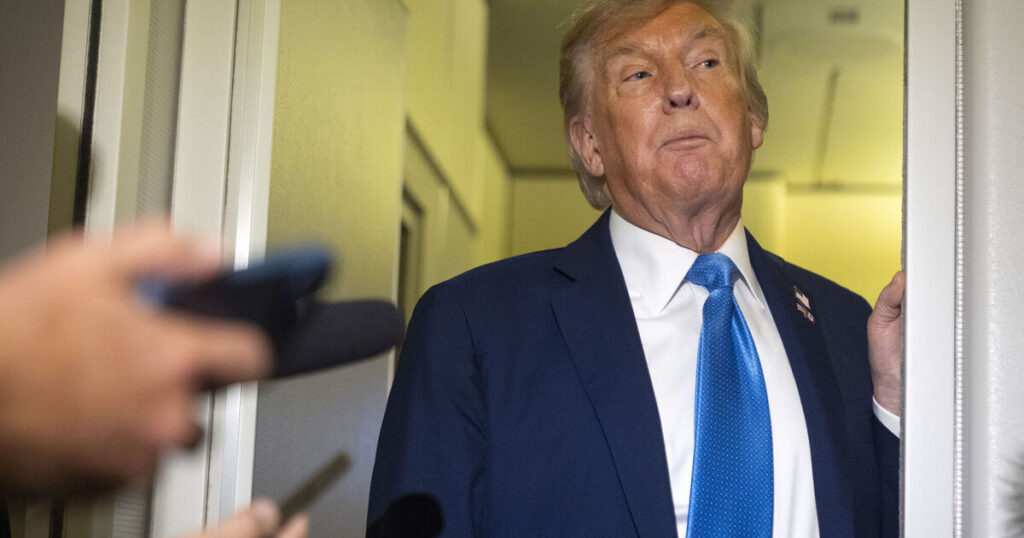President Donald Trump said on Tuesday that US patience was wearing thin but it had no immediate intention to “take out” Iran’s leader, while indicating he could dispatch diplomatic envoys as the Israel-Iran air war raged for a fifth day.
Israeli Defence Minister Israel Katz said meanwhile that Iran’s Supreme Leader Ayatollah Ali Khamenei could face the same fate as Iraqi President Saddam Hussein, who was toppled in a US-led invasion and eventually hanged after a trial.
“I warn the Iranian dictator against continuing to commit war crimes and fire missiles at Israeli citizens,” Katz told top Israeli military officials.
Explosions were later reported in the Iranian capital, Tehran and in the city of Isfahan in central Iran, while Israel said Iran had fired more missiles towards it, and air raid sirens sounded in Tel Aviv and southern Israel.
Trump predicted on Monday that Israel would not be easing its attacks on Iran, launched on Friday. But he also said he might send US Middle East Envoy Steve Witkoff or Vice President JD Vance to meet Iranian officials.
Trump had said his early departure from the Group of Seven nations summit in Canada had “nothing to do with” working on a deal between Israel and Iran, and that something “much bigger” than that was expected.
In a further post on Tuesday, the US president said Khamenei’s whereabouts were known, but “we are not going to take him out (kill!), at least not for now,” while adding: “Our patience is wearing thin.”
Vance said the decision on whether to take further action to end Iran’s uranium enrichment programme, which Western powers suspect is aimed at developing a nuclear bomb, “ultimately belongs to the president”. Britain’s leader said there was no indication that the US was about to enter the conflict.
Khamenei’s main military and security advisers have been killed by Israeli strikes, leaving major holes in his inner circle and raising the risk of strategic errors, according to five people familiar with his decision-making process.
The Israeli military said Iran’s military leadership was “on the run” and that it had killed Iran’s wartime chief of staff, Ali Shadmani, overnight, four days after he had replaced another top commander killed in the strikes.
With Iranian leaders suffering their most dangerous security breach since the 1979 Islamic Revolution that toppled a US-backed monarch and led to clerical rule, the country’s cybersecurity command banned officials from using communications devices and mobile phones, Fars news agency reported.
Israel had launched a “massive cyber war” against Iran’s digital infrastructure, Iranian media reported.
Ever since the Iran-backed Hamas attacked Israel on October 7, 2023 and triggered the Gaza war, Khamenei’s regional influence has been weakening as Israel has pounded Iran’s proxies – from Hamas in Gaza to Hezbollah in Lebanon, the Houthis in Yemen and militias in Iraq. And Iran’s close ally, Syria’s autocratic president Bashar al-Assad, has been ousted.
Israel launched its air war, its largest ever, on Iran, after saying it had concluded that the Islamic Republic was on the verge of developing a nuclear weapon.
Iran denies seeking nuclear weapons and has pointed to its right to nuclear technology for peaceful purposes, including enrichment, as a party to the Non-Proliferation Treaty.
Israel, which is not a party to the NPT, is the only country in the Middle East widely believed to have nuclear weapons. Israel does not deny or confirm that.
Israeli Prime Minister Benjamin Netanyahu has stressed that he will not back down until Iran’s nuclear development is disabled, while Trump says the Israeli assault could end if Iran agrees to strict curbs on enrichment.
Before Israel’s attack began, the 35-nation board of governors of the UN nuclear watchdog, the International Atomic Energy Agency, declared Iran in breach of its non-proliferation obligations for the first time in almost 20 years.
The IAEA said on Tuesday there were indications of direct impacts on the underground enrichment halls at the Natanz facility, and that there was no change to report at the Fordow and Isfahan sites.
Katz said the Iranian nuclear installation at Fordow, where an enrichment site is dug deep into a mountain, was an issue that will “of course” be addressed.
Israel says it now has control of Iranian airspace and intends to escalate the campaign in the coming days.
Israel’s advantage appears to clear the way for expanding bombardment, though it will struggle to deal a knock-out blow to deeply buried nuclear sites without the US joining the attack, according to analysis echoed on Tuesday by Germany’s leader.
Iran has so far fired nearly 400 ballistic missiles and hundreds of drones towards Israel, with about 35 missiles penetrating Israel’s defensive shield and making impact, Israeli officials say.
Iran’s Revolutionary Guards said they had hit Israel’s Military Intelligence Directorate and the foreign intelligence service Mossad’s operational centre early on Tuesday. There was no Israeli confirmation of such attacks.
Iranian officials have reported 224 deaths, mostly civilians, while Israel said 24 civilians had been killed. Residents of both countries have been evacuated or have fled.
World oil markets are on high alert, following strikes on energy sites including the South Pars gas field, shared by Iran and Qatar and the world’s biggest.
Two oil tankers collided and caught fire on Tuesday near the Strait of Hormuz, where electronic interference has surged during the conflict between Iran and Israel, but there were no injuries to crew or spillage reported. About a fifth of the world’s total oil consumption passes through the waterway.


